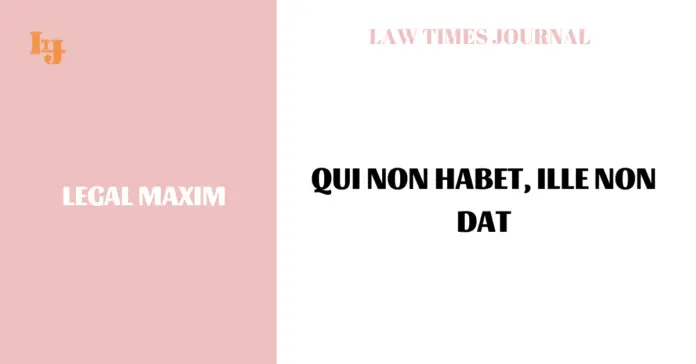
Literal Meaning
He who has not, gives not.
Explanation
According to this legal maxim a person who himself is not in possession of a particular thing cannot offer it to anyone else. In simple words, if someone gets something because it was transferred to him- as a bequest, sale, gift, etc., he will only have that title which the previous owner had and nothing more. [1]
Illustration
Suppose, X transfers his property to Y. Then X turns around and transfers the property to Z. Following the rule of nemo dat quod non habet, Y will get the right from X. Now Y have the rights and X have none. So X cannot transfer Z the property. The rule of nemo dat has its base as a chain of transactions.
Indian Law Position
The maxim ‘Qui Non Habet, Ille Non Dat’ is reflected in the Section 27 of the Sale of Goods Act, 1930 provides following –
“27. Sale by person not the owner
Subject to the provisions of this Act and of any other law for the time being in force, where goods are sold by a person who is not the owner thereof and who does not sell them under the authority or with the consent of the owner, the buyer acquires no better title to the goods than the seller had, unless the owner of the goods is by his conduct precluded from denying the seller’s authority to sell:
Provided that, where a mercantile agent is, with the consent of the owner, in possession of the goods or of a document of title to the goods, any sale made by him, when acting in the ordinary course of business of a mercantile agent, shall be as valid as if he were expressly authorized by the owner of the goods to make the same; provided that the buyer acts is good faith and has not at the time of the contract of sale notice that the seller has not authority to sell.”[2]
The above-mentioned section of the Sale of Goods act basically states that when any goods are sold by a person who is not the real owner of the goods and sells them without proper authority and consent from the real owner, the buyer acquires no better title to the goods than the seller had.[3]
Case Laws
G.Srinivasan v. K.Ganesan
In the above-mentioned case, the maxim ‘Qui Non Habet, Ille Non Dat’ was considered by the honourable Madras High Court. [4]
Ajit Singh v. Union of India
In the above-mentioned case also the maxim ‘Qui Non Habet, Ille Non Dat’ was considered by honourable Allahabad High Court. [5]
Abn Amro Bank Nv v. Joint Commissioner of Income Tax
In the above mentioned case Section 21 of the Sale of Goods Act, 1930 was considered.[6]
Edited by Vigneshwar Ramasubramania
Approved & Published – Sakshi Raje
Reference
[1] See Pramit Bhattacharya, Nemo Dat Quod Non Habet, IPleaders (July 2, 2019, 3:22PM), https://blog.ipleaders.in/nemo-dat-quod-non-habet/
[2] Sale of Goods Act 1930, s. 27.
[3] Supra note 1.
[4] G.Srinivasan vs K.Ganesan, S.A.No.563 of 2011.
[5] Ajit Singh vs Union Of India, Writ- C No 41653 of 2015.
[5] Abn Amro Bank Nv vs Joint Commissioner Of Income Tax, (2005) 96 TTJ Kol 1041.






